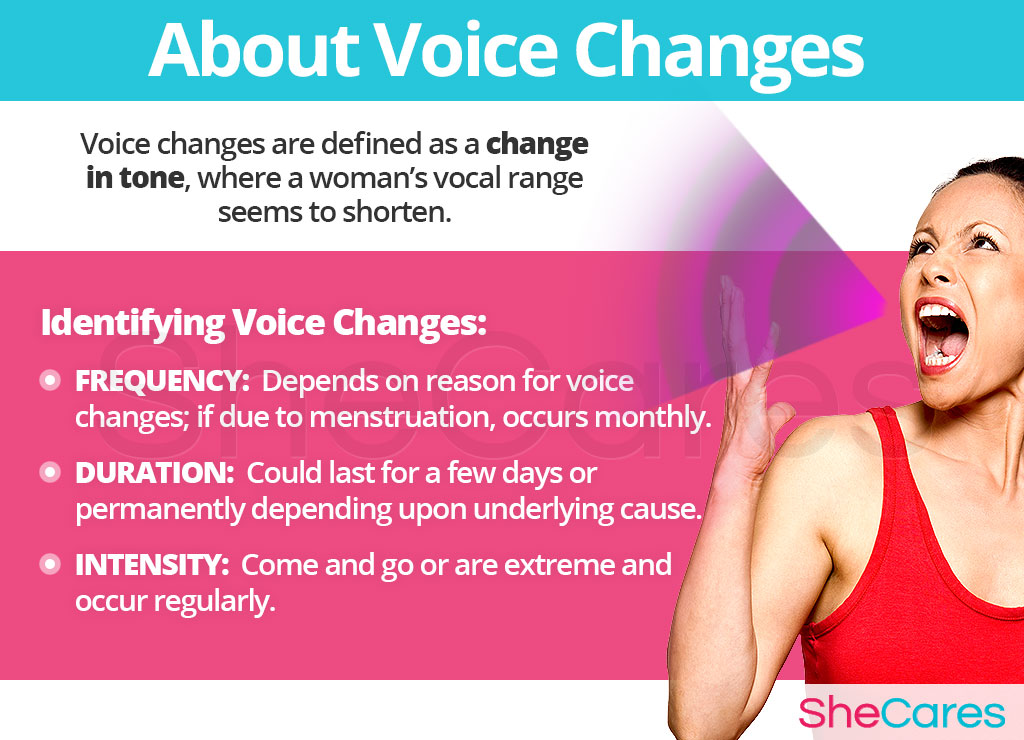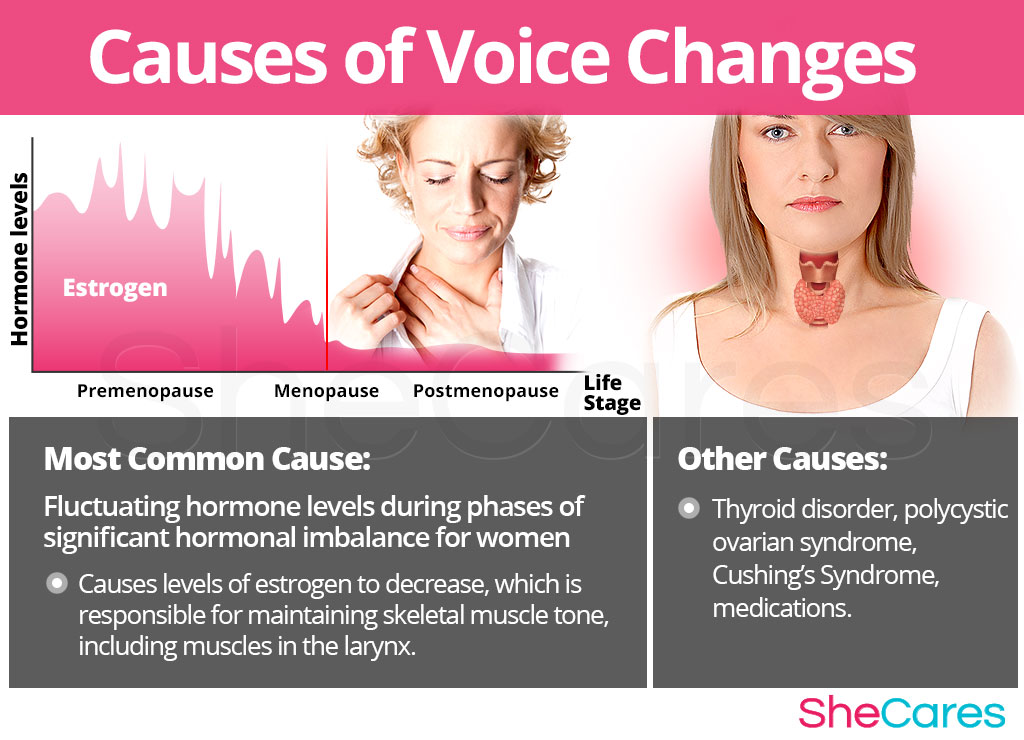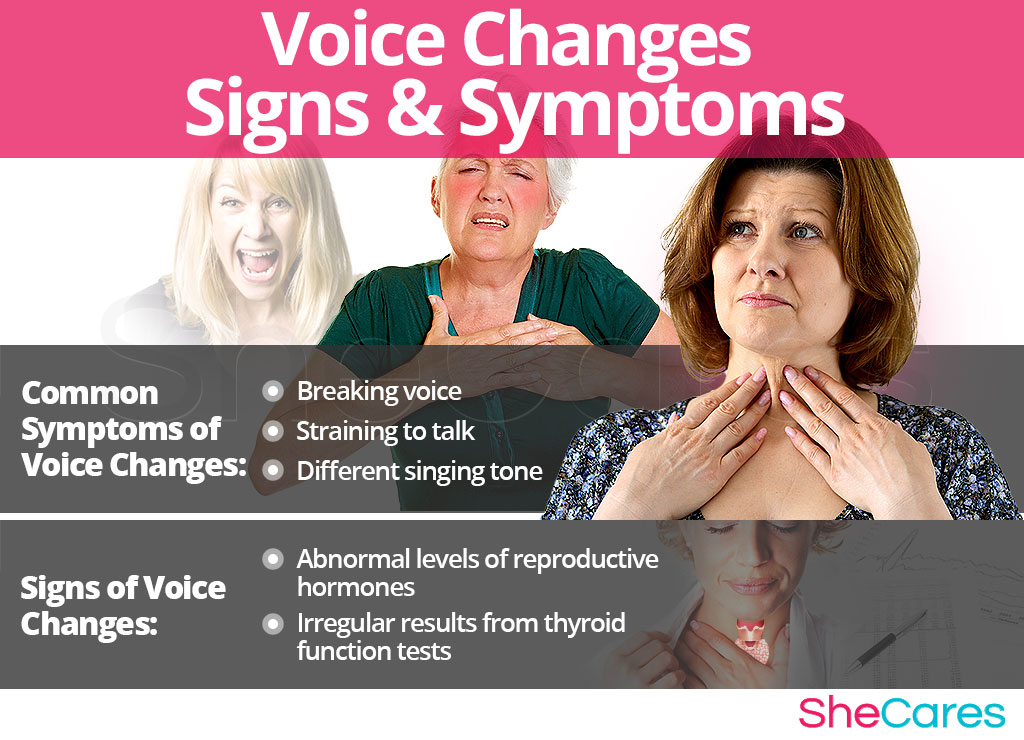About
Quick Facts about Voice Changes
- During puberty, female vocal cords can grow up to 4mm. Male vocal cords can increase by 10mm.
- Up to 33% of women are thought to suffer with changes to their voice during PMS.
- Women who suffer from voice changes each month have an increased chance of suffering it during menopause.
Voice changes are characterized by a change in tone, whereby a woman's vocal range appears to shorten. One of the most likely causes of voice changes for women is hormonal imbalance. Although hormonal fluctuations take place naturally during a woman's menstrual cycle, many women suffer from disruptive symptoms of this hormonal imbalance, which is known as premenstrual syndrome or PMS.
Significant hormonal changes also take place during certain stages of reproductive life, such as puberty, pregnancy, post-partum - including breastfeeding - and menopause. These hormonal changes, like during PMS, can affect physical functioning, leading to symptoms like voice changes.
Identifying Voice Changes
It is difficult to accurately establish the different types of voice change, since the individual experience of them can be drastically different from woman to woman. However, there are three criteria that can help identify ways in which this symptom may vary: frequency, duration, and intensity.
In order to understand the processes behind voice changes, continue on to the next section to read about their hormonal and non-hormonal causes.

Causes
Learning about the causes of voice changes provides the key to understanding how to prevent and treat this troublesome symptom. While changes in voice can be attributed to a complex web of factors, most doctors and researchers believe hormonal changes are the primary cause of it. In addition to these completely normal hormonal causes, other factors and medical conditions can, in more rare instances, cause changes in voice.
Continue reading to learn more about both the hormonal and additional causes of voice changes.
Hormonal Causes of Voice Changes
Hormones are chemical messengers that control every process in the body, so when changes in these hormone levels occur, certain health disorders can arise. Medical researchers have found that fluctuating levels of hormones, especially lowered amounts of estrogen, make women more susceptible to experiencing a voice change. This is because estrogen is responsible for maintaining the tone of skeletal muscles, including muscles in the larynx.
A deficiency in estrogen at certain points in the menstrual cycle and during phases of significant hormonal imbalance - puberty, pregnancy, post-partum, and menopause - causes levels of estrogen to decrease, and can consequently result in change to the tone of a woman's voice. In this sense, we can say that voice changes are largely caused by the hormonal fluctuations during the changes women go through during their reproductive life.
Furthermore, there are also specific hormonal causes and typical environmental factors which can explain the occurrence of voice changes according to the stage of a woman's reproductive life in which this disorder appears, such as around PMS and during puberty, pregnancy, post-partum, and menopause.
Hormonal Causes during Different Phases in a Woman's Life
PMS is a consequence of hormonal fluctuations linked to the menstrual cycle. It is a collection of disorders, which may include changes of voice, among others.
Puberty is the stage in which a girl's body begins to produce reproductive hormones; these and other factors, such as facial development and increased lung capacity, contribute to voice changes during puberty.
Pregnancy leads to extreme changes in the production of reproductive hormones, which can lead to voice changes.
Postpartum and breastfeeding is another stage where reproductive hormones are imbalanced, leading to symptoms like voice changes. Also, other factors contribute to voice changes in postpartum, like emotional stress.
Menopause is the stage in a woman's life when production of reproductive hormones naturally declines, signaling the end of a woman's fertility. As well as hormonal causes, other factors add to the reasons for voice change during menopause, including the experience of other symptoms of menopause.
Other Less Common Causes of Voice Changes
While hormonal imbalance is the major underlying cause of voice changes during a woman's life, experts also point out that a difference in voice tone may be caused by other, less common, underlying conditions including thyroid conditions, polycystic ovary syndrome, and as a side effect of certain types of medication.
Keep reading to learn what these risk factors and triggers are that have such a profound effect on a woman's experience of voice changes.

Risk Factors and Triggers
Risk Factors for Voice Changes
Some women are more likely than others to suffer from voice changes because of inherent behavioral and health reasons - such as obesity, medical conditions, or overuse. These predisposing factors can affect a woman's hormone levels and increase the chances of her voice changing during her reproductive life.
Triggers of Voice Changes
In addition to long-term risk factors, a deepening or hoarser voice can also be triggered by certain environmental factors and behavioral habits. Avoiding these unhealthy environments or habits as much as possible may help to avoid the onset of voice changing symptoms. These include habits like smoking and caffeine consumption, as well as other external triggers.
Continue reading to discover the symptoms and signs of voice changes to be able to choose a treatment specific to its cause.

Signs and Symptoms
Because each woman may detect different changes in her voice, each individual experience will vary. However, many symptoms of voice changes are common among women undergoing hormonal imbalance.
Common Symptoms of Voice Changes
- Breaking voice
- Straining to talk
- Different singing tone
What other symptoms might occur with voice changes? In addition to these general symptoms, voice changes may be accompanied by other symptoms that vary depending on the underlying cause or the specific stage which the woman is going through.
Other Symptoms that May Accompany Hormonal Voice Changes
- Growth of body hair
- Missed menstrual cycles
- Nausea with or without vomiting
- Shortness of breath
- Sleep disorders
Signs of Voice Changes
As opposed to more noticeable symptoms, medical signs are measurable criteria that are usually assessed by a physician. The following medical signs will most likely be taken into account by a physician when diagnosing the disorder:
- Rapid or irregular heartbeat
- Fluctuating blood pressure
- Slightly elevated or reduced body temperature
- Abnormal blood levels of reproductive hormones
- Abnormal bone density reading
Diagnosis of Voice Changes
To diagnose and identify the symptoms of voice changes, a doctor must typically perform three procedures. First, he or she should review the patient's medical history, and then conduct a physical exam. The doctor may order additional tests, if necessary.
Complications of Voice Changes
In rare cases, when voice changes are left untreated, they can lead to certain complications, which are riskier for a woman's physical health. However, it is important to remember that in the majority of cases, voice changes will not require any serious medical intervention. These possible, but uncommon, complications of changes in voice can include anxiety and vocal fatigue, and they have some specific warning signs.
Women who experience frequent voice changes that are interfering with their daily lives may wish to treat or learn how to prevent them. Keep reading below to learn useful techniques and habits that will prevent voice changes or make them more manageable.

Prevention and Management
Preventing Voice Changes
While there is no single way to completely prevent voice changes, just as there is no way to stave off natural hormonal processes, there are a few steps that a woman can take to lessen her chances of developing severe voice changes, or to minimize the frequency of voice change episodes.
Lifestyle changes for prevention are extremely important, especially with regard to diet, exercise, and healthy habits. Moreover, women may seek ways to complement these lifestyle approaches with the use of supplements that help enhance the endocrine system and, therefore, help prevent or ease symptoms of hormonal imbalance such as voice changes.
For women who are already going through the disorder, prevention may not be possible if voice changes have already appeared. Fortunately, there are many ways to manage it in order to prevent, or to lessen the intensity of, the symptoms. Keep reading to learn about the different ways to manage voice changes.
Managing Voice Changes
There are effective ways to instantly manage voice changes wherever a woman happens to be when experiencing them. Making minor daily changes and avoiding triggers can make a huge difference for women who are trying to manage voice changes.
There are certain tips and tricks available that can help improve the experience of voice changes, giving women the tools they need to cope with sudden deepening of the voice. There are general tips that women of all ages can use, such as drinking enough water, maintaining a good sleeping position, and steam inhalation.
Alternative Management Tips for Voice Changes
Alternative treatments are also a great way to manage voice changes. These treatments will not tackle the hormonal cause behind most women's voice changes, but they are effective in reducing stress in the short and medium term. Alternative treatments include massage, ear plugs, and parsley.
While these measures often help to reduce the frequency and intensity of voice changes, they are unable to treat the root of the problem, which in most cases is hormonal imbalance. However, there are several natural treatments that can treat the hormonal causes of voice changes. Please continue to the next section to learn more about treating voice changes. Keep reading to discover approaches to treatments for voice changes.

Treatments
Voice changes, a common consequence of hormonal imbalance, can be frustrating for any woman who experiences them; however, some changes to the voice are so severe that they begin to interfere with daily life. Fortunately, it is more than possible to find an effective treatment for voice changes.
Three Approaches to Treat Voice Changes
Three levels of approaches can be considered for treating voice changes. These are categorized as: (1) Lifestyle Changes, (2) Alternative Medicine, and (3) Pharmaceutical Options.
Women are encouraged to begin with the least risky approach to voice change treatment, lifestyle adjustments, and then proceed to the next level of care. While medical intervention is not usually necessary to treat voice changes, some women who are unable to find relief from lifestyle changes and alternative medicine may wish to consider pharmaceutical options, after properly assessing the risks associated with such a treatment.
Lifestyle Changes for Voice Changes
This primary level of treatment involves the least amount of risk, though conversely it requires the highest amount of self discipline. Often simple changes in lifestyle can reap huge benefits in fighting voice changes, and achieving a higher overall level of health. Fundamentally, an improved diet, regular exercise, and healthy habits can do a woman great service.
While these changes will help alleviate voice changes, they do not directly address hormonal imbalance - the most common cause of voice changes - so further treatment may be necessary. Alternative medicine has proven to be an excellent way of treating voice changes related to hormonal imbalance in a safe and natural way.
Alternative Medicine for Voice Changes
Alternative medicines and supplements involve little to no risk and can be an extremely effective way to treat voice changes. In the case of herbal supplements, there are two main types that can be used: phytoestrogenic and hormone-regulating herbal supplements.
Phytoestrogenic herbal supplements
These supplements, such as black cohosh, contain estrogenic components produced by plants that complement the low estrogen hormones in a woman's body, helping alleviate changes to the voice. By introducing plant-based estrogens into the body, these herbs treat the underlying estrogen deficiency behind voice changes.
They are mainly effective for menopausal women who are more likely to have low estrogen levels but are not necessarily effective for women in other stages of life such as puberty.
Hormone-regulating herbal supplements
These supplements, including Macafem stimulate the body's natural hormone production by nourishing the pituitary and endocrine glands, helping the whole hormonal system produce hormones more efficiently. This ultimately results in balancing not only estrogen but other important hormones such as progesterone.
These supplements can be considered the safest and most natural way to treat the underlying hormonal imbalance behind voice changes, and can be taken throughout a woman's life, as they support the body's natural hormone production.
Additionally, there are some other types of supplements that can also alleviate voice changes, or at least make them more manageable, including vitamins and other herbal supplements.
A combination of approaches is usually the most effective route to take. Lifestyle changes combined with alternative medicine will most likely be the best way to alleviate the symptoms of voice changes. However, for some women the symptoms will be so severe that a more drastic treatment is necessary.
Pharmaceutical Options for Voice Changes
Interventions at the third level involve the highest risk and often the highest costs. Not all treatments are suitable for women at every life stage, so it is strongly recommended to speak to a licensed healthcare practitioner before starting any pharmaceutical treatments for voice changes.
There are two main types of pharmaceutical options that can be prescribed to treat voice changes: hormonal replacement therapy and oral contraceptives.
These three approaches are not mutually exclusive. A woman may use different approaches at different times or any combination of them, depending on the duration and severity of symptoms. Today more and more women find that dealing with menopause symptoms is best accomplished via a combination of healthy lifestyle and alternative treatments.

Sources
- PubMed. (1986). Changing relationship between stature and lung volumes during puberty. Retrieved August 3, 2013, from http://www.ncbi.nlm.nih.gov/pubmed/3764119
- PubMed. (1999). Sex Hormones and the Female Voice. Retrieved August 3, 2013, from http://www.ncbi.nlm.nih.gov/pubmed/10498059
- PubMed. (1993). The effects of premenstrual syndrome on the female singer. Retrieved August 3, 2013, from http://www.ncbi.nlm.nih.gov/pubmed/8293066
- National Health Service UK. (2011). Laryngeal (Larynx) Cancer. Retrieved August 3, 2013, from http://www.nhs.uk/Conditions/Cancer-of-the-larynx/Pages/Introduction.aspx
- National Health Service UK. (2011) Laryngitis. Retrieved August 3, 2013, from http://www.nhs.uk/conditions/laryngitis/pages/treatment.aspx
- MedlinePlus. (2013). Voice Disorders. Retrieved August 3, 2013, from http://www.nlm.nih.gov/medlineplus/voicedisorders.html
